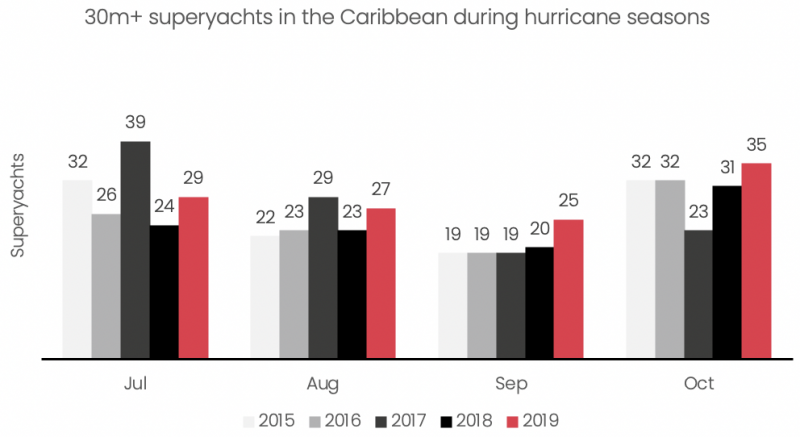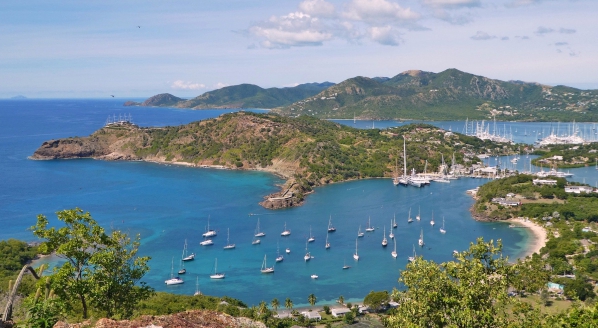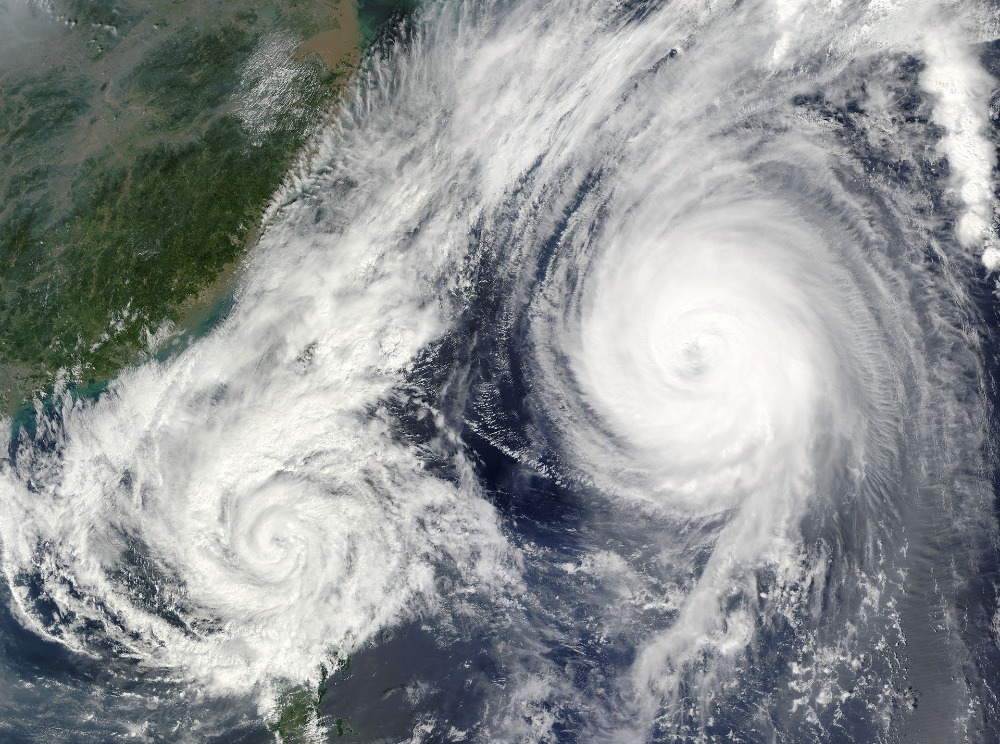Hurricane season 2021 breaks new records
SuperyachtNews speaks with Adrian McCourt, group chief engineer at Munich RE McCourt…
As the 2021 Atlantic storm season swings into full gear, the prediction of an active season appears to have come to fruition. The ongoing La Niña weather pattern has held, and the Atlantic Ocean temperatures, especially in the Caribbean and Gulf of Mexico, are higher than average. The fuel that drives storms appears abundant, and the conditions in place for another busy storm season.
Records set and records broken appears to be the recent trend for storm system frequency and severity. Phillip Klotzbach, Meteorologist at CSU (Colorado State University), specializing in Atlantic basin seasonal hurricane forecasts, has noted that according to their analysis, 2020 was the 5th consecutive year of above-average accumulated hurricane energy for the Atlantic region. The formation of Tropical Storm Elsa on July 1st marked the 5th named storm of the season. To give context, this broke the record (set last year) for the earliest date where the 5th storm of the season is named and is a full 6 weeks earlier than the average since records began.
Adrian McCourt, group chief engineer at Munich RE McCourt, has been amalgamating and disseminating key data from multiple metrological sources to the marine industry for nearly 15 years. SuperyachtNews speaks with McCourt about how the upcoming season is shaping, relative to predictions, and how it may affect superyachts in the region. ‘This will be another very active season; how this will impact the superyacht market is a tough question to answer. For example, the cruise lines. Come what may (putting aside Covid the related shut-down), they operate out of Miami throughout the season. Big powerful stabilised ships and smart planning can generally skirt cyclones without too much disruption. The same goes for the larger yachts.’
After the devastating 2017 hurricane season, the loss of life and property, and the observed trend in increased storm severity, many had expected a superyacht migration away from the Caribbean. However, this is not what McCourt has observed. ‘I don’t know of any Caribbean based yachts whose owners have decided to shift to the Med this year because there is an active season expected. Those who usually stay in the Caribbean are still staying there. The smaller yachts permanently based in the region aren’t crossing the Atlantic either, but relying on good forecasting and planning.’

The Superyacht Agency's historical data supports McCourt's assertion, with a slight increase in superyachts remaining in the Caribbean 2015-2019.
Forecasting and the ability to avoid these damaging weather systems has been a game of cat and mouse that those who wish to remain in the hurricane-affected areas have played for a long time. A slight change in circumstances and the full force of Hurricane Irma may also have hit West Palm Beach in 2017, and we may have had an entirely different damage toll to the superyacht sector and rippling consequences across the industry. Still, the last 5 years have changed attitudes, as McCourt highlights. ‘The eye-watering losses over the last five years have taken a bite out of underwriters’ capital, and more risk management is expected of the larger marinas and repair yards, for example. Hurricane response plans, for example, were once kept in a forgotten manual on a dusty shelf but are now a condition of cover for many and need to be effective.’
As McCourt points out, weather system prediction and planning is still at the forefront of safe superyacht operation in the Caribbean in the summer months. Yachts are larger, more powerful and more connected today than at any point in history. As McCourt also highlights, the reach of observational technology is impressive but may have overrun the scope of usable predictability. ‘Owners expect Captains to be savvy about storm management - and many I speak to are a long way ahead of me. Captains or owners of boats in dry-dock or repair yards in Florida or other hurricane exposed locations to take a very long view at approaching cyclones, far longer (and probably less reliable) than the data I am looking at. It is impossible to predict what a cyclone will do when it forms in the eastern Atlantic, but I am still asked.’
2021 is not predicted to reach the devastating levels of the 2020 hurricane season, where 30 named storms formed, and 11 made landfall in the United States alone. Hopefully, these predictions are correct, however with the generalised trend towards stronger and more forceful storms, without careful planning and consultation with expert advice, the cat and mouse game in the Caribbean may become a safe harbour too far.
NEW: Sign up for SuperyachtNewsweek!
Get the latest weekly news, in-depth reports, intelligence, and strategic insights, delivered directly from The Superyacht Group's editors and market analysts.
Stay at the forefront of the superyacht industry with SuperyachtNewsweek
Click here to become part of The Superyacht Group community, and join us in our mission to make this industry accessible to all, and prosperous for the long-term. We are offering access to the superyacht industry’s most comprehensive and longstanding archive of business-critical information, as well as a comprehensive, real-time superyacht fleet database, for just £10 per month, because we are One Industry with One Mission. Sign up here.
Related news

Preparing for hurricane season during a lockdown
SuperyachtNews investigates the protocol required under current conditions
Owner

Superyacht Charities’ first Winter Ball raises over £25,000
The UK-based charity concluded 2019 with over £100,000 raised in one year
Business
Related news
Preparing for hurricane season during a lockdown
6 years ago
NEW: Sign up for
SuperyachtNewsweek!
Get the latest weekly news, in-depth reports, intelligence, and strategic insights, delivered directly from The Superyacht Group's editors and market analysts.
Stay at the forefront of the superyacht industry with SuperyachtNewsweek




